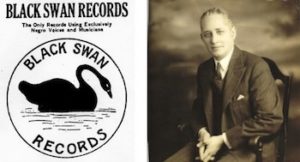
Harry Pace
Harry Pace was born on this date in 1884. He was a Black music publisher and insurance executive.
Harry Herbert Pace was born in Covington, Georgia. His father, Charles Pace, was a blacksmith who died while Harry was an infant. Thus his mother, Nancy Francis Pace, raised him. Light-skinned and extremely bright, Pace finished elementary school at age twelve and graduated valedictorian of his class seven years later from Atlanta University. He was A disciple of his college professor, W. E. B. DuBois, and his concept of the talented tenth. Upon graduation, Pace worked in the printing, banking, and insurance industries in Atlanta and Memphis.
In various junior executive positions, he demonstrated a strong awareness of the tactics of commerce and had a reputation for rebuilding failing enterprises. After receiving another degree in 1903, Pace went into the printing business with Du Bois in Memphis. Two years later, they put together the short-lived magazine The Moon Illustrated Weekly, the first illustrated African American journal. During this stopover in the South, two significant things would affect him.
First, In 1912, in Memphis, he met and collaborated with W. C. Handy, who took a liking to Pace; they wrote songs together. Later they would develop the Pace and Handy Music Company, which brought him to New York City. Secondly, he met and married Ethylene Bibb, who would be a great inspiration in his life. Around 1920, the company began working with composers William Grant Still and Fletcher Henderson. Although the company did well and his financial status improved, Pace did not like Handy’s business methods and resigned.
He formed his own phonograph company, Black Swan, the first Black-owned record company. In 1925, he founded the Northeastern Life Insurance Company in Newark, New Jersey, a venture that became the largest Black-owned business in the North during the 1930s. Besides his insurance business, Pace attended Chicago Law School, receiving his degree in 1933. He was active in Democratic Party politics. He opened a law firm in downtown Chicago in 1942, but it has been said that disgruntled employees accused Pace of trying to “pass” for white.
This hurt him deeply, he withdrew from the Black community, and Harry Pace died the following year.
ASCAP Biographical Dictionary
R. R. Bowker Co., Copyright 1980
ISBN 0-8351-1283-1